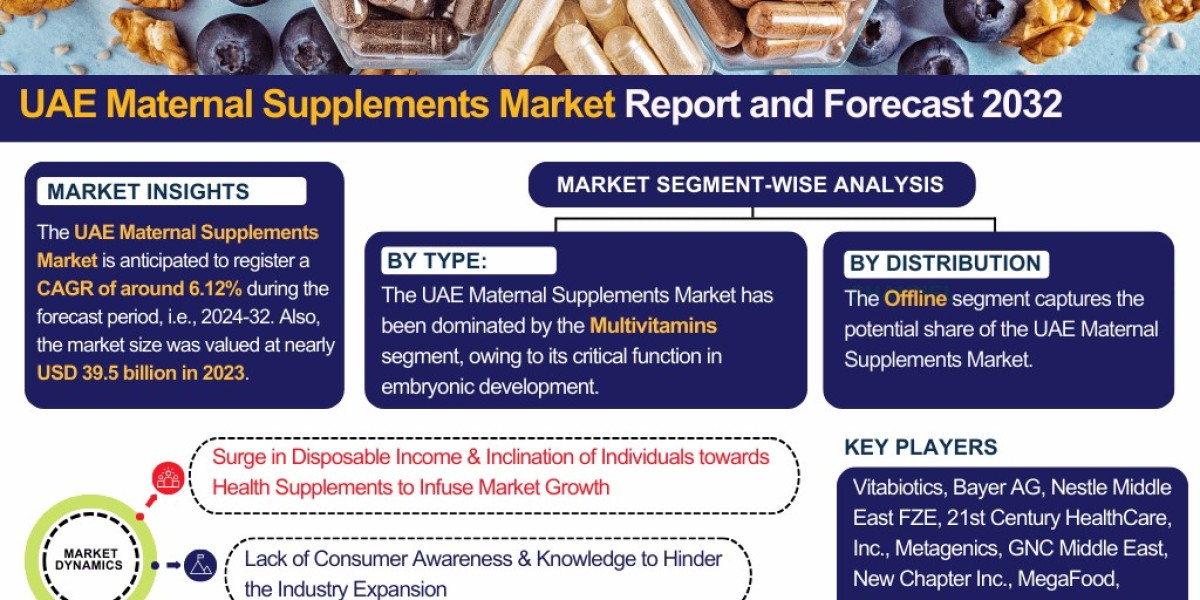Introduction
Pregnancy is a transformative journey that demands optimal nutrition for both the mother and the developing baby. While a balanced diet is crucial, maternal supplements play a vital role in filling nutritional gaps, ensuring healthy fetal development, and supporting maternal well-being. With increasing awareness about prenatal health, the demand for maternal supplements is growing rapidly.
According to The Report Cubes, the UAE Maternal Supplements Market was valued at nearly USD 39.5 billion in 2023 and is projected to grow at a CAGR of around 6.12% from 2024 to 2032. This growth reflects the rising emphasis on maternal health and the increasing availability of scientifically formulated supplements.
In this article, we will explore the importance of maternal supplements, key nutrients required during pregnancy, and how to choose the right supplements for a healthy pregnancy.
Why Are Maternal Supplements Important?
Pregnancy increases the body’s nutritional demands, and even a well-balanced diet may not provide all the necessary vitamins and minerals in the required amounts. Maternal supplements help in:
- Supporting fetal growth (brain, bones, and organ development)
- Reducing the risk of birth defects (neural tube defects, low birth weight)
- Boosting maternal health (preventing anemia, strengthening immunity)
- Enhancing energy levels (combating pregnancy fatigue)
The World Health Organization (WHO) and healthcare providers globally recommend certain supplements to ensure both mother and baby receive adequate nutrition.
Key Nutrients in Maternal Supplements
1. Folic Acid (Vitamin B9)
- Why it’s important: Prevents neural tube defects (spina bifida) in the baby.
- Recommended dosage: 400–800 mcg daily before conception and during the first trimester.
2. Iron
- Why it’s important: Prevents anemia, supports increased blood volume, and ensures oxygen supply to the baby.
- Recommended dosage: 27 mg per day (higher doses may be prescribed if deficient).
3. Calcium
- Why it’s important: Supports baby’s bone and teeth development; prevents maternal bone loss.
- Recommended dosage: 1,000–1,300 mg daily (from diet + supplements).
4. Vitamin D
- Why it’s important: Aids calcium absorption, supports immune function, and reduces preterm birth risk.
- Recommended dosage: 600–800 IU daily.
5. Omega-3 Fatty Acids (DHA & EPA)
- Why it’s important: Crucial for baby’s brain and eye development; may reduce postpartum depression risk.
- Recommended dosage: 200–300 mg of DHA daily.
6. Iodine
- Why it’s important: Essential for thyroid function and fetal brain development.
- Recommended dosage: 150–220 mcg daily.
7. Magnesium
- Why it’s important: Helps prevent leg cramps, supports muscle and nerve function.
- Recommended dosage: 350–400 mg daily.
8. Prenatal Multivitamins
- A combination of essential vitamins and minerals tailored for pregnancy needs.
Choosing the Right Maternal Supplements
With numerous options available, selecting the right supplement can be overwhelming. Here’s what to consider:
✅ Doctor’s Recommendation: Always consult a healthcare provider before starting any supplement.
✅ Quality & Certification: Look for supplements tested by third-party organizations (USP, NSF).
✅ Form (Tablet, Gummy, Liquid): Choose based on ease of consumption.
✅ Brand Reputation: Opt for trusted brands with positive reviews.
✅ Allergen-Free Options: Check for gluten-free, vegan, or non-GMO labels if needed.
Market Trends: UAE Maternal Supplements Industry Growth
The UAE maternal supplements market is expanding due to:
✔ Increasing Awareness: More women are prioritizing prenatal health.
✔ Rising Disposable Income: Affordability of high-quality supplements.
✔ Government Initiatives: Programs promoting maternal and child health.
✔ E-Commerce Growth: Easy access to international supplement brands.
According to The Report Cubes, the market is expected to grow at 6.12% CAGR (2024–2032), driven by demand for fortified and organic supplements.
Potential Risks & Precautions
While supplements are beneficial, excessive intake can be harmful:
⚠ Vitamin A Overdose: Can cause birth defects (avoid high-dose retinol).
⚠ Iron Overload: May lead to constipation or toxicity.
⚠ Herbal Supplements: Some herbs (e.g., fenugreek, ephedra) are unsafe during pregnancy.
Always follow medical advice and avoid self-prescribing.
Conclusion
Maternal supplements are a cornerstone of prenatal care, ensuring both mother and baby receive vital nutrients for a healthy pregnancy. With the UAE maternal supplements market projected to grow at 6.12% annually, the focus on scientifically backed, high-quality products is stronger than ever.
Before starting any supplement, consult your doctor, choose trusted brands, and prioritize a nutrient-rich diet alongside supplementation. A well-nourished mother leads to a healthier, happier pregnancy journey!








